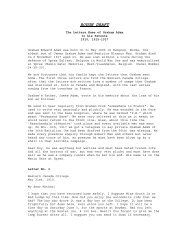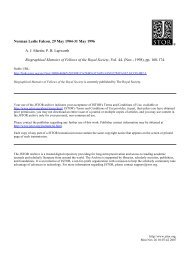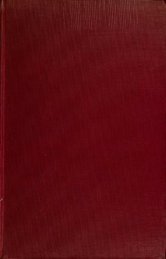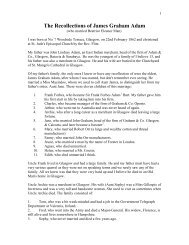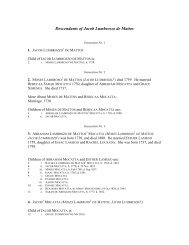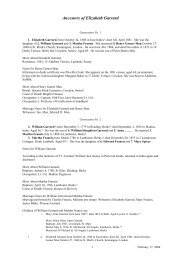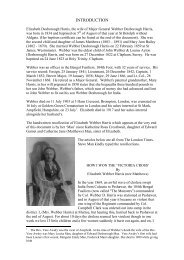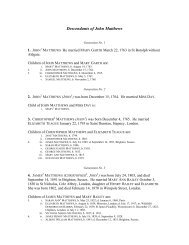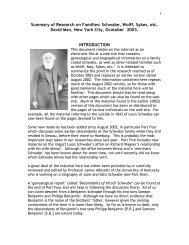Richard Craddock's Career with the East India Company - Man Family
Richard Craddock's Career with the East India Company - Man Family
Richard Craddock's Career with the East India Company - Man Family
Create successful ePaper yourself
Turn your PDF publications into a flip-book with our unique Google optimized e-Paper software.
28<br />
received from Ahmadabad, converted at <strong>the</strong> rate of 2s. 3d.<br />
(two shillings and three pence) to <strong>the</strong> rupee, gave an<br />
annual rate of £150; though it included nothing for food.<br />
This far exceeded <strong>the</strong> rate sanctioned by <strong>the</strong> home<br />
authorities. However, <strong>the</strong>y directed Craddock to place in a<br />
separate account certain ‘charges merchant’; to enter under<br />
<strong>the</strong> head of ‘presents’ <strong>the</strong> cost of arrack given ‘to <strong>the</strong><br />
officers of <strong>the</strong> Durbar and Kotwal’; and to reduce to just<br />
one <strong>the</strong> three peons employed ‘for <strong>the</strong> quickening up of your<br />
dyers, washers, beaters, etc.’ If <strong>the</strong>se changes were made,<br />
and <strong>the</strong> expenses of diet should prove ‘not extraordinary’,<br />
<strong>the</strong>y trusted <strong>the</strong> <strong>Company</strong> would allow <strong>the</strong> amount. They<br />
approved <strong>the</strong> purchase of new indigo, but desired that a<br />
preference should be given to <strong>the</strong> flat variety, as <strong>the</strong><br />
round was not esteemed in England. (EFI 55-60, p.165)<br />
(EFI 55-60 pp. 162-165. For details see Letters: October 18<br />
1658 Surat to Ahmadabad (p. 244); Nov 9 1658 (p. 249); Nov<br />
13 1658 (p.254); Nov 20 1658 (p. 260) in Factory Records<br />
Surat Vol. 84 part 3))<br />
1659<br />
Cradock’s honesty, integrity and steadfastness were<br />
rewarded in 1659. On 31 January of that year Anthony Smith<br />
was called down from Ahmadabad and <strong>the</strong> factory <strong>the</strong>re was<br />
placed under <strong>the</strong> superintendence of Craddock <strong>with</strong><br />
injunctions that, until Smith returned, ‘all <strong>the</strong> ceremonies<br />
that belong to <strong>the</strong> chief of your factory are not to be<br />
used’. However this arrangement was altered by a letter<br />
from Surat dated 3 June 1659, notifying Craddock of his<br />
appointment as chief, <strong>with</strong> Nicholas Bladwell as his second.<br />
We learn later (EFI 61-64 p. 22-23) that Smith had left<br />
personal debts behind in Ahmadabad which caused Craddock<br />
considerable trouble, as Smith’s creditors would not allow<br />
Craddock to send down <strong>the</strong> <strong>Company</strong>’s goods to Surat until<br />
<strong>the</strong>y had obtained satisfaction.<br />
But Smith’s debts were not <strong>the</strong> only problems facing<br />
Craddock. In a letter sent by <strong>the</strong> Surat office to <strong>the</strong><br />
company in London we learn more of Craddock’s situation.<br />
From Ahmadabad we can expect no indigo <strong>the</strong> next year,<br />
unless <strong>the</strong> crop proves great; for we hear [from Craddock]<br />
<strong>the</strong>re will be very little or none of this year’s stocks



